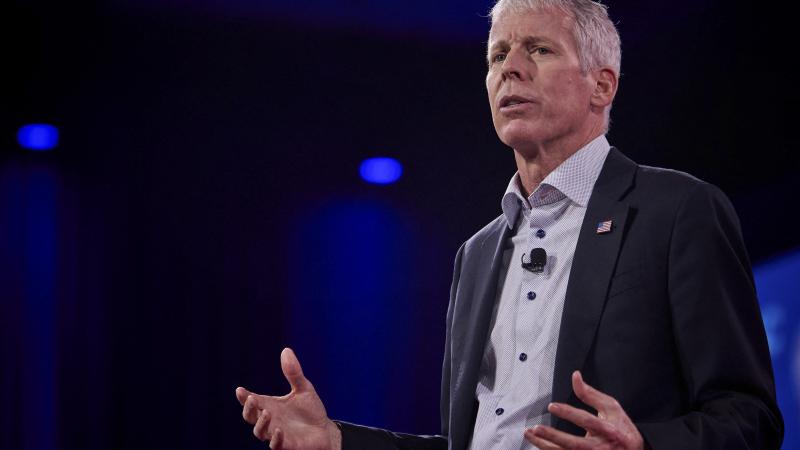Critics slam congressionally mandated new National Climate Assessment as flawed, misleading, biased
One author of the new assessment reportedly works for a company that makes money off carbon offsetting through carbon removal technology.
The federal government recently released its "Fifth National Climate Assessment" that was followed by such headlines as "The science is irrefutable" and "No place in the US is safe from the climate crisis."
However, some critics say the report's claims of above-average U.S. temperature increases use a questionable methodology and included authors who are outspoken climate activists and-or have ignored research integral to measuring disaster costs.
In 1990, Congress mandated that the U.S. Global Change Research Program delivers a report at least once every four years that analyzes the impacts of climate change and projects major trends out to 100 years.
Its intent is to inform policymakers across the country at all levels of government, and it wields considerable influence on U.S. environmental and energy policy.
The assessment’s calculations of the costs of disasters has captured a lot of media attention in the mainstream press and scientific journals.
From 2018 to 2022, according to the assessment, the U.S. was hit by 89 climate disasters that cost at least $1 billion in damages. This is about one every three weeks, an increase from one every four weeks in the 1980s.
Dr. Roger Pielke Jr., professor of environmental studies at the University of Colorado at Boulder, told Just The News the calculations of the number of billion-dollar disasters fail to normalize costs, which he said is vital to measuring trends.
Pielke has been doing extensive research into the normalization of costs of climate disasters and finds consistently the trends are either flat or declining.
Normalization controls for differences in wealth over time so there’s a consistent measurement when looking at trends.
So, for example, a Category 3 hurricane hitting Miami Beach in the 1920s would impact far less development that a hurricane of equal magnitude hitting the same beach today. Since wealth has grown over time, the costs of disasters will increase regardless of the trends in extreme weather.
It’s not a fringe concept, either, Pielke said.
“Normalizing economic losses from disasters is broadly accepted. For instance, the UN Sustainable Development Goals identifies reducing disaster losses as a percent of GDP as a metric of success,” he said.
In response to the climate assessment’s claims of increasing frequency of billion-dollar disasters, several reviewers had asked the NCA to cite Pielke and his colleagues’ peer-reviewed studies on extreme weather events and damage losses.
In one response, the NCA researchers argued that Pielke’s research is “inconsistent with the author team’s thorough assessment of the science.”
In another response, the NCA said it wouldn’t cite the work of Pielke et al. because it's limited to disaster costs up to 2005. However, a 2018 article in the journal Nature that Pielke co-authored appears to contradict that assessment.
Pielke’s research is widely cited in climate research, including assessments by the U.N. Intergovernmental Panel on Climate Change , and Pielke said there are dozens of these normalization studies. The NCA cited none.
The media regularly report on assessments finding non-normalized increases in billion-dollar disasters, and Pielke said journalists ignore his research as much as the authors of the latest climate assessment did.
“Legacy media reporters on the climate beat never call me, literally never,” he said.
Andrew Freedman of Axios, in response to Pielke’s criticism of Freedman’s reporting on the topic, told Pielke he is on a “do not call” list.
In a Substack article on his critique of the climate assessment, Pielke points out that there are some conflicts of interest with the authors on the climate assessment’s chapter on climate trends.
The lead author of the chapter is Kate Marvel, who works for Project Drawdown, which promotes the renewable energy industry as a means of stopping global warming. Another author of the chapter, Zeke Hausfather, works for Stripe Inc., which makes money from carbon offsetting through carbon removal technology.
Katherine Hayhoe, atmospheric scientist with the Texas Tech University, is also chief scientist with The Nature Conservancy, a climate advocacy nonprofit.
Pielke suggested on X that people should imagine if authors were connected to pro-fossil fuel organizations such as The Heartland Institute, the Cato Institute, or Exxon.
“That’s how bad this is,” Pielke said in his post.
Just The News reached out to Marvel, Hausfather and Hayhoe for comment and didn’t receive a response.
Other critics have also slammed methodology the climate assessment uses to claim the U.S. is warming faster than other places on the planet.
The report spliced together data from temperatures of the continuous U.S. from 1880 to the present with a mix of data from Alaska, Hawaii, Puerto Rico, and other islands affiliated with the U.S. That trend line is then compared to the average global land and ocean temperature averages over the same period.
Dr. Ryan Maue, a meteorologist, argues on his X feed, this is not comparing similar datasets. Land is warming faster than the ocean, he said, so it’s misleading to compare U.S. average temperature to a global land and ocean average temperature.
Responding to a request from Maue for a graph comparing similar data sets, Chris Colose, a climate scientist at NASA Goddard Institute for Space Studies, compiled one comparing global land with U.S. land temperatures.
Colose found the U.S., while seeing more temperature ranges between highs and lows since 1880, is following a trend similar to global average land temperatures.
On his Substack, Pielke said he believes the authors of the latest climate assessment misrepresent science because the process has been structured to wield science as a political tool by making strong scientific claims, which then push the political response to climate change in a direction the program participants want.
The Facts Inside Our Reporter's Notebook
Links
- Fifth National Climate Assessment
- warming faster than anywhere else
- global warming is hurting everyone
- no place in America is safe
- delivers a report at least once every four years
- scientific journals
- extensive research
- controls for differences in wealth over time
- thorough assessment of the science
- because it's limited to disaster costs up to 2005
- which isn't true
- Intergovernmental Panel on Climate Change
- told Pielke he is on a "do not call" list
- critique of the climate assessment
- authors
- promotes the renewable energy industry
- makes money from carbon offsetting through carbon removal technology
- chief scientist with The Nature Conservancy
- imagine if authors were connected to pro-fossil fuel organizations
- report spliced together data
- not comparing similar datasets
- compiled a graph
- On his Substack
- placed under the auspices of the White House
















